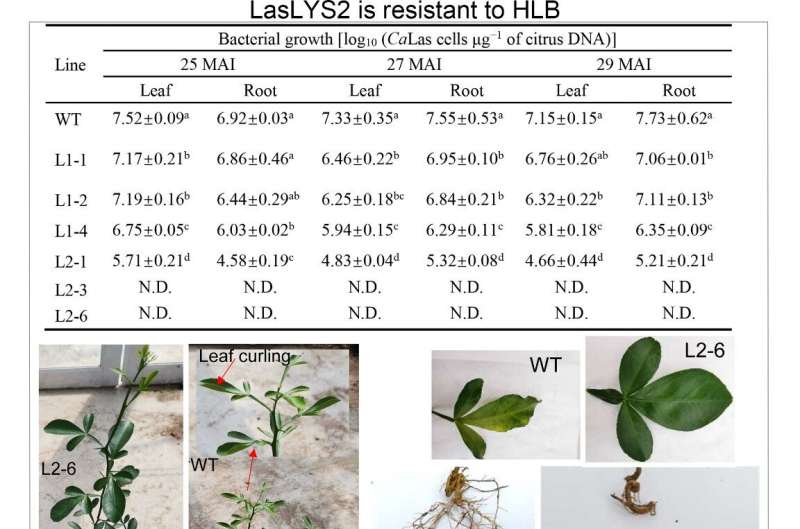This article has been reviewed according to Science X's editorial process and policies. Editors have highlighted the following attributes while ensuring the content's credibility:
fact-checked
trusted source
proofread
A promising bacterial suicide gene against citrus Huanglongbing and canker

Huanglongbing (HLB), caused by Candidatus Liberibacter asiaticus (CaLas), is the No. 1 killer of citrus trees worldwide. HLB causes billions of dollars in annual economic losses to the global citrus industry.
At present, no HLB-resistant cultivars and no effective therapeutic agents is available for citrus farmers. Citrus canker disease, caused by Xanthomonas citri pv.citri (Xcc), is another devastating disease in the citrus industry, which can harm almost all citrus cultivars and is currently on the outbreak trend. Breeding disease-resistant varieties is the fundamental way to prevent HLB and citrus canker.
Bacteriophages are the natural enemies of bacteria. They mainly secrete endolysins to the host cell periplasm through the Holin-endolysin lysis system and break the cell wall to kill bacteria. Therefore, endolysin is also considered to be a bacterial suicide gene. Bacteriophages and their lytic genes are a powerful means to control disease by triggering bacterial "suicide" to suppress pathogen growth.
In August 2023, Horticulture Research published a research paper entitled by "An endolysin gene from Candidatus Liberibacter asiaticus confers dual resistance to Huanglongbing and citrus canker." The researchers found that an endolysin encoded by the CaLas prophage has dual resistance to Huanglongbing and citrus canker.
In this study, two endolysin genes LasLYS1 and LasLYS2 were cloned from the CaLas genome. In vitro antibacterial assays show that LasLYS2 had visible bactericidal activity against several rhizobium bacteria and Xcc. More than two years of greenhouse testing confirm that LasLYS1 and LasLYS2 had durable resistance to HLB. Importantly, LasLYS2 transgenic plants do not show symptoms such as leaf chlorosis and root rot, but also LasLYS2 can completely clear CaLas from infected plants.
LasLYS2 transgenic plants with enhanced HLB resistance also exhibit resistance to citrus canker. Ectopic expression of LasLYS1 and LasLYS2 in citrus promote the proliferation of beneficial bacteria Burkholderiaceae and Rhodanobacteraceae but inhibit the growth of Xanthomonadaceae and Rhizobiaceae in roots, which favors citrus defense response.
Further, the research team reveals that Lyz domain 2 was the key bactericidal motif of LasLYS2. Based on the structures of LasLYS1 and LasLYS2, researchers successfully synthesize four new endolysins with killing activity against CaLas and Xcc.
In summary, the research provides insights for engineering bactericidal proteins or peptides against citrus HLB and canker pathogens, but also for breeding new citrus germplasm with broad-spectrum resistance.
More information: Lanzhen Xu et al, An endolysin gene from Candidatus Liberibacter asiaticus confers dual resistance to Huanglongbing and citrus canker, Horticulture Research (2023). DOI: 10.1093/hr/uhad159
Provided by NanJing Agricultural University



















